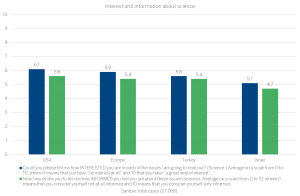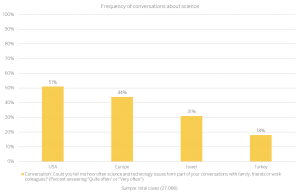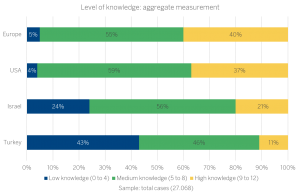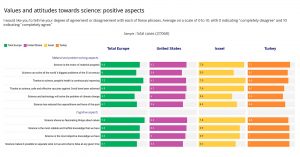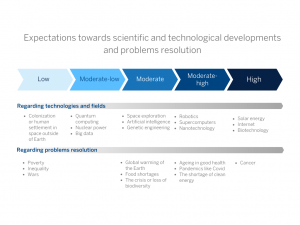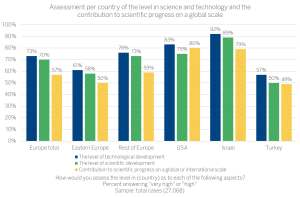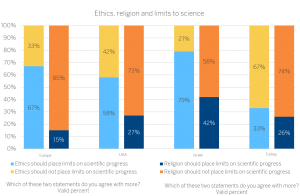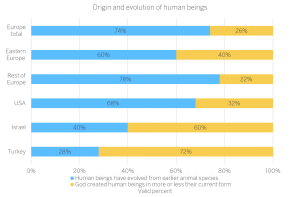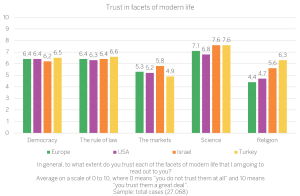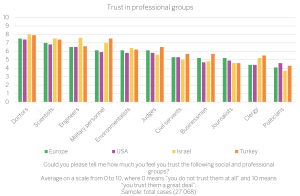
A majority of citizens in Europe, the United States, Turkey and Israel trust in science as the most reliable source of knowledge, and believe in its potential to solve the key challenges of the 21st century
At a time of recurrent debate about the threat of “post-truth” and the questioning of rationality on the part of certain global elites, it becomes particularly important to analyze to what extent science – associated with truthfulness, objectivity and rational debate – forms part of the general fabric of beliefs, knowledge, values and attitudes prevailing in society, while avoiding the assumption that the culture and conduct of elites is identical to or even reflective of that of the public as a whole or most of its members. A country’s scientific culture includes the knowledge held by its citizens concerning both basic scientific concepts and the modes of operation and validation of scientific research. It also encompasses their values, attitudes and expectations towards science, and the trust they place in the results of science and in scientists as a professional group.
12 March, 2024
With this in mind, the BBVA Foundation has conducted an extensive empirical study of scientific culture in 15 European countries, including Germany, Denmark, Spain, France, Italy, the Netherlands, Portugal and the United Kingdom, as well as several countries of the former Eastern bloc – Bulgaria, Slovakia, Estonia, Hungary, Poland, the Czech Republic and Romania –, along with three other societies with disparate profiles: the United States, Israel and Turkey. The main conclusion of the study is that scientific culture has permeated all the countries surveyed.
Interest, informedness, conversation and closeness
The societies analyzed share an interest in science, seeking information on it via the media and social networks, and exhibit a medium level of basic scientific knowledge, assessed through a sample of essential concepts. The highest levels of interest and declared informedness are reported in the United States (6.1 and 5.6 respectively on a scale from 0 to 10) and the lowest in relative terms, albeit still above the midpoint on the scale, in Turkey (5.6 and 5.4) and Israel (5.1 and 4.7).
Science has also found its way, albeit less markedly, into the daily exchanges of the adult population, with more than 40% of Europeans and Americans saying that science is a quite frequent or very frequent part of their conversations.
Interest, informedness and conversation are the pillars of citizens’ closeness to science, which stands at a medium level across the 18 countries analyzed.
[For more information on interest, informedness and conversation by country, see slides 1 and 2 of the Appendix]
Level of knowledge
Level of scientific knowledge is assessed via a battery of questions dealing with 12 basic concepts or notions. The results reveal significant differences between countries, with knowledge higher across Europe (average of 7.9 correct answers on a scale from 0 to 12) and the United States (7.8), and lower in Israel (6.4) and Turkey (5.2). While the “low level of knowledge” segment is very small in Europe and the United States (between 4% and 5%), it climbs some six times higher (24%) in Israel and ten times higher in Turkey (43%). The other extreme – “high level of knowledge” – includes almost four out of every ten Europeans and Americans, dropping to half that in Israel (21%) and to just 11% in Turkey, evidencing a marked social stratification of knowledge within the population.
[For more information on level of knowledge by country and sociodemographic segment, see slides 3 and 4 of the Appendix]
Besides an understanding of basic concepts, scientific culture also includes an understanding of how science works and how it validates its results and models. In this methodological facet, large majorities in all the countries analyzed understand the process of validation of scientific knowledge, and attach great importance to the testing of theories by experiments, and to the fact that such experiments can be reproduced by other researchers (with scores for both experimentation and results reproducibility exceeding 85%). Nearly 70% of respondents in all societies believe that the way to transform the new knowledge produced by a group of researchers into public knowledge for the research community as a whole is through the advance being published in a specialized journal. And a majority also feel that the truthfulness of scientific theories is not something fixed but may be questioned and overtaken by subsequent advances (80% in Europe, 79% in the United States, 66% in Israel and 55% in Turkey).
[For more information on the validation of scientific knowledge, see slide 5 and 6 of the Appendix]
Values, attitudes and expectations
As well as these components of interest, informedness and level of knowledge, scientific culture also takes in a set of views, attitudes and expectations towards science and the scientific community. A majority of citizens believe that science provides “the most reliable, objective and truthful knowledge,” with average acceptance scores on a scale of 0 to 10 of 7 in Turkey, 6.9 in Israel, 6.6 in Europe and 6.2 in the United States. Respondents also consider that science shows us fascinating things about nature (6.3 in the United States, 6.8 in Turkey, 7.4 in Europe and 7.8 in Israel) and makes it possible to separate what is true from what is false at any given time (5.6 in the United States, 6.1 in Europe, 6.2 in Israel, and 7 in Turkey).
Citizens broadly embrace the idea that science is the motor of material progress (average agreement score of 6.6 on a scale from 0 to 10 among European citizens, 6.2 among Americans, 7.6 among Israelis and 7.1 among Turks), with the potential to solve the major problems of the 21st century, concretely health problems in both general terms (7.2 in Europe, 6.1 in the United States, 7.9 in Israel and 6.8 in Turkey) and in the specific case of achieving safe and effective vaccines against COVID (6.8 in Europe, 6.2 in the United States, 7.6 in Israel and 6.1 in Turkey).
Expectations are positive, albeit less so, regarding science’s potential to solve climate change, the biodiversity crisis or food shortages, and fall away sharply when considering social challenges like wars, poverty and inequality.
[For more information on the problem-solving potential of science and technology, see slides 7 and 8 of the Appendix]
The picture is ambivalent regarding the relationship between science and nature. Opinions are divided both between and within countries over whether “changes in nature made through science and technology often make things worse” (average of 5.2 in Europe on an agreement scale from 0 to 10, 4.8 in the United States, 5.2 in Israel and 5.0 in Turkey), and whether it would be better if human beings did not meddle in nature through science and technology (4.8 in Europe, 4.7 in the United States, 5.0 in Israel and 6.8 in Turkey).
There is also widespread agreement with the idea that technology “is changing our way of life too quickly,” which finds strong support in Turkey (7.5), rather less in Europe (6.5) and Israel (6.4), and more subdued support in the United States (5.5). There is also a division of opinions, albeit with agreement predominating, about the dehumanization caused by technology (5.7 in Turkey, and 5.1 in Europe and Israel), the exception being the United States (4.6) with a majority dissenting.
Asked about the expectations raised by different technologies, a majority believe that solar energy, Internet and biotechnology will improve their lives, but are less upbeat about artificial intelligence and space exploration. Meantime, public perceptions are split in the cases of nuclear power and Big Data.
[For more information on expectations regarding science and technology, see slides 9-13 of the Appendix]
There is firm agreement that science is an essential part of national history and identity, on the same plane as art and literature. In Europe agreement with science’s importance for the country’s identity averages 7.3 on a scale from 0 to 10 compared to 7.7 for art and literature.
Assessments vary regarding each country’s scientific and technological level and its contribution to the progress of knowledge on a global scale. Citizens in the United States and Israel stand out for how highly they rate their country’s level of scientific and technological development and its contribution to global scientific progress. In both countries, ample majorities (above 75%) consider its level and contribution to be high or very high.
[For more information on assessments of each country’s scientific and technological level and contribution, see slide 14 of the Appendix]
Science, ethics and religion
A relevant aspect of a society’s scientific culture is how its citizens feel about the interaction of science with ethics and religion.
Asked about the role of these two areas in placing limits on the advancement of science, respondents in all countries, with the exception of Turkey, say it should be ethical considerations that impose such limits, with large majorities rejecting any limiting role for religion.
[For more information on opinions about whether religion or ethics should place limits on scientific progress, see slide 15 of the Appendix]
There is also across-the-board consensus around the ideas that science and religion coexist without problems and that science does not destroy religious beliefs.
[For more information on the relationship between science and religion by country, see slides 16 and 17 of the Appendix]
Notwithstanding these shared overall assessments of the interaction between science, ethics and religion, we find differences emerging between and within countries about the origin of human beings. Sizable minorities in the countries of Eastern Europe and the United States, and majorities in Israel and Turkey, believe that human beings were created by God in more or less their current form, compared to large majorities in Western Europe who have assimilated the scientific idea that human beings evolved from earlier animal species.
[For more information on views on the origins and evolution of human beings by country, see slides 18 and 19 of the Appendix]
Trust in science and scientists
The degree of trust felt in scientific activity and in scientists as a professional group is another key dimension of a country’s scientific culture. In all the countries surveyed, science occupied the top reaches of the trust map, with respondents assigning scores to a series of areas and institutions central to advanced societies.
Other pillars of advanced modern societies like democracy, the rule of law and the markets were also clearly considered trustworthy, albeit less so than science, while religion as an institution only reached the threshold of trust in Eastern European countries (5.0), Israel (5.6) and Turkey (6.3), with its average European trust score falling short of 5.
Moving on from trust in science as a cultural and institutional construct to trust in the scientific community, we find that doctors, scientists and technologists are among the most trusted professional groups, though reservations are felt about their independence from corporate or political powers. There is majority agreement to the effect that scientists are not influenced by religion, except in Turkey, where opinion is more divided.
[For more information on views on science and independence with a breakdown by country, see slide 20 of the Appendix]
As to the regulation of science, a majority in the United States, Eastern Europe and Turkey believe it should be scientists themselves who control their research. Remaining European countries show more division of opinion, with 46% believing it should be controlled by scientists, 36% by society and 17% by the State.
[For more information on the regulation of science with a breakdown by country, see slide 21 of the Appendix]
Scientific culture, a “mental GPS” widely applied in the survey countries
The results of the study show that scientific culture has permeated the societies analyzed and acts as a widely shared mental GPS. At a time when some elite groups are questioning the truthfulness of scientific evidence and the media are giving time and space to a supposed crisis of rationality, the majority of citizens are keenly aware of science’s key role as our most reliable source of knowledge and an effective tool to address many of today’s challenges. In particular, there is widespread trust in science’s potential to tackle challenges in the fields of health, energy and the environment, albeit mixed with strong reservations about its ability to solve social problems like poverty, inequality and armed conflict.
Even in societies whose level of scientific knowledge is relatively low, the majority of citizens appear favorably disposed to science, placing their trust in it as one of the central pillars of a modern society, as well as in scientists as a professional group. Despite some reservations about science’s impact on nature, and the speed at which technological advances are transforming our way of life, the attitudes of citizens are predominantly positive across the countries in the survey. In sum, there is little sign among them of rampant irrationalism or relativism, despite the exaggerated attention paid in the news space to the “post truth” phenomenon, confined in fact to certain elites on both sides of the Atlantic.
Differences according to sociodemographic, cognitive and ideological variables
The above overview exhibits some significant differences by reference to sociodemographic (gender and age), cognitive (formal education and level of scientific knowledge) and ideological (political self-positioning) variables.
Gender
Gender does not account for substantive differences in terms of closeness, knowledge, expectations and trust towards science in Europe and the United States. Only in Israel and Turkey are levels of closeness, knowledge and expectations somewhat higher among men than among women.
Age
Levels of closeness, expectations and trust towards science tend to be more favorable among younger than older age groups, the differences being more pronounced in Europe than in the remaining survey countries.
Level of knowledge follows a similar pattern – with young people scoring higher – in Western European countries, the United States and Turkey, in contrast to the Eastern European countries and Israel, which depart from this template.
Age too accounts for significant differences in views on the origin and evolution of human beings in Europe and, more so, in the United States, where the scientific explanation of the origin of humans tends to increase among younger age groups. In Turkey and Israel, this pattern is less marked.
Educational level
Level of scientific culture increases with subjects’ educational level, with both closeness and expectations standing higher among those with more years of study. Differences by educational level are even more pronounced in Israel than in remaining survey countries.
It is the segment still studying that expresses the highest levels of knowledge, closeness and, especially, favorable expectations with regard to different applications and technologies.
The scientific explanation of the origin and evolution of human beings also rises in concert with educational level and among those still studying.
Scientific knowledge
Level of scientific knowledge positively influences expectations towards science. Hence the segment with more favorable expectations is larger among those equipped with more knowledge. In Europe this segment accounts on average for 43% of those with high knowledge against 25% of those with low knowledge, the equivalent percentages being 47% versus 38% in the United States, 48% versus 31% in Turkey, and in Israel, the country with the most notable difference, 74% versus 30%.
Likewise, trust is science and scientists is greater among those with a higher level of knowledge, while trust in religion and religious personnel stands higher among those with less knowledge of science. This cognitive dimension also contributes to shaping views on the origin of human beings, with the scientific explanation finding stronger support among those with more knowledge, and the creationist view among those with a low level of scientific knowledge. Counter to the widespread thesis that there is no relationship between knowledge and attitudes, these results confirm that the level of closeness and familiarity with science is associated with favorable beliefs and attitudes towards science and trust in the scientific community.
Ideological self-identification
Ideology operates in different ways according to the country. In some, like Spain and Israel, closeness, knowledge and expectations towards science are slightly higher among those identifying as on the left than as on the right. Conversely, ideology has no clear impact in Europe on average, or in the United States or Turkey.
Political leanings also make a sharp difference in Israelis’ views on the origin and evolution of human beings, with a majority of those avowedly on the left accepting the scientific explanation, as opposed to the majority of those identifying themselves as on the right, who tend to lean towards the creationist view.
Technical notes
- Geographical scope of the study: Bulgaria, Czech Republic, Denmark, Estonia, France, Germany, Hungary, Italy, Netherlands, Poland, Portugal, Romania, Slovakia, Spain, United Kingdom, United States, Israel and Turkey.
- Universe: in each country, the general population aged 18 and over.
- Method: computer-assisted telephone survey and, in Turkey and Israel, personal survey.
- Sample size and distribution: 1,500 cases per country. Multistage sample distribution stratified by region (NUTS classification or equivalent)/size of habitat, with primary units selected at random at municipality level and selection of individuals according to sex and age quotas.
- Sampling error: the estimated sampling error is +/- 2.6% for each country for a 95% confidence level and in the worst case scenario (p=q=0.5).
- Fieldwork was carried out between April and July,
- Weighting: for the results of the European countries surveyed, the data for each country have been weighted according to the population weight of each in the universe of European countries.
- The fieldwork was coordinated and conducted by KANTAR PUBLIC (currently Verian) with registered address in Madrid, Calle Poeta Maragall, 23. 28020.
- The design of the questionnaire and data analysis were the work of the BBVA Foundation Department of Social and Public Opinion Studies.

